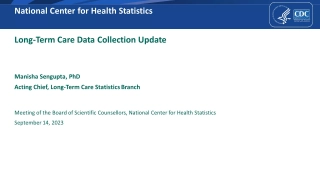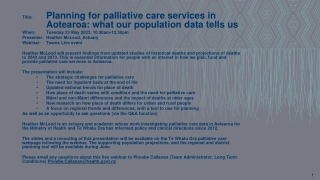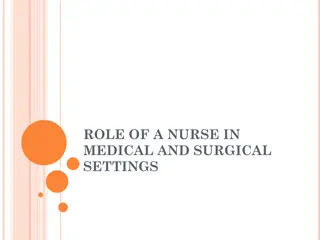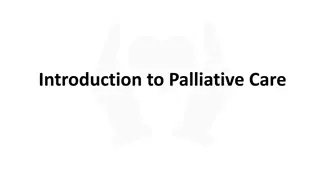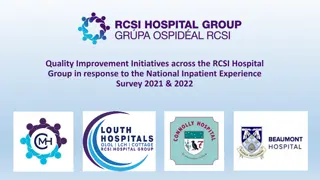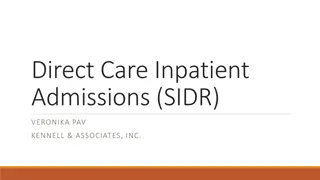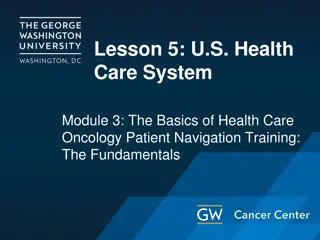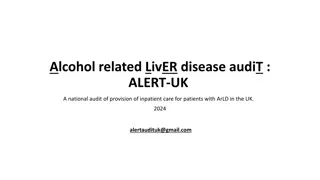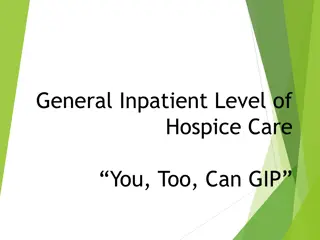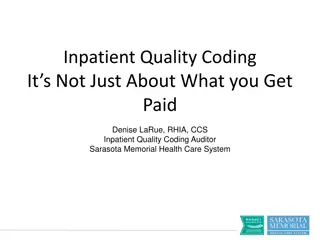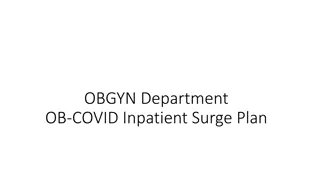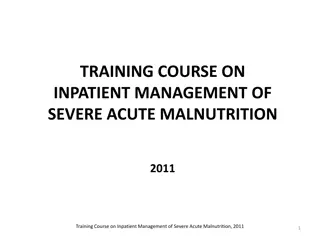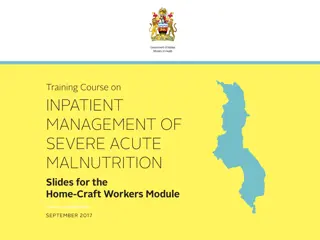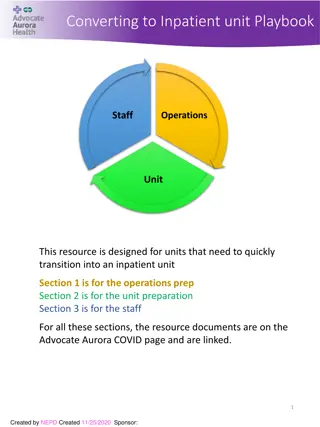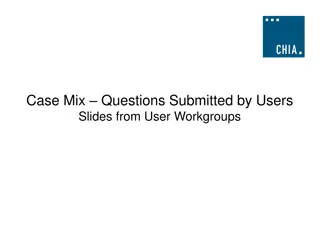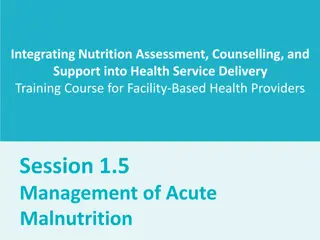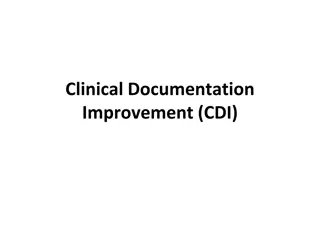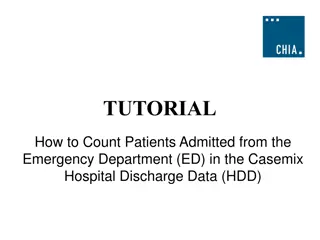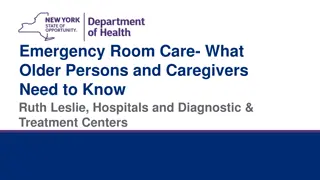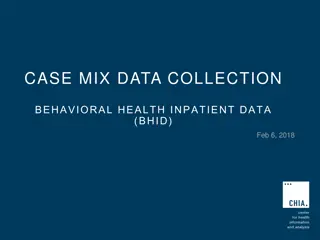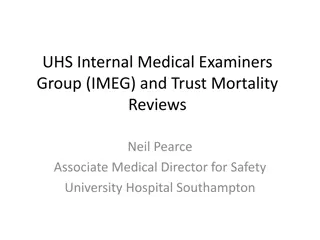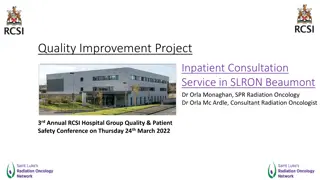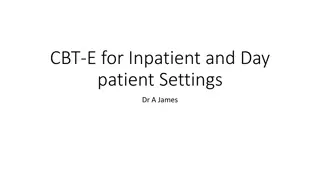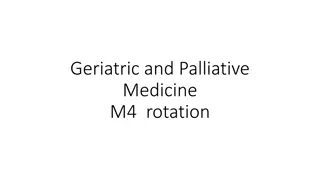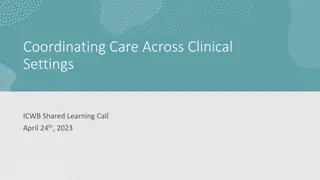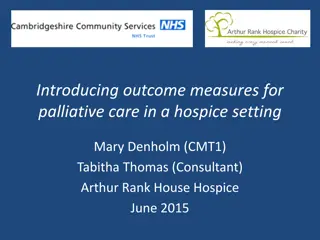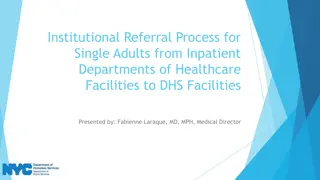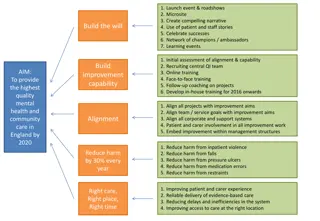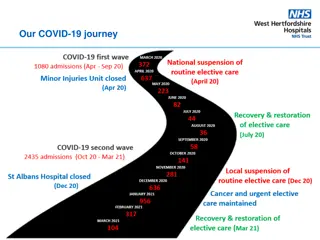National Center for Health Statistics - Long-Term Care Data Collection Update
Get the latest update on long-term care data collection through the National Post-acute and Long-term Care Study. Explore sectors like home health care, hospital inpatient rehab, adult day services, residential care, community hospice, and nursing home. Discover the challenges, data sources, and fut
2 views • 14 slides
Medicaid Managed Care Trends in Minnesota's Health Market
Explore the unique landscape of Minnesota's Medicaid managed care system, highlighting key trends for providers and health plans, financial analysis, hospital interactions, and a comparison with other states. Discover the differences in Minnesota's healthcare structure, including limited presence of
1 views • 19 slides
Planning for Palliative Care Services in Aotearoa: Insights from Population Data
Explore vital insights and projections on palliative care services in Aotearoa, presented by actuary Heather McLeod. Discover strategic challenges, inpatient bed needs, national death trends, Maori differentials, urban vs. rural data, and regional variations for informed planning and provision of pa
0 views • 95 slides
Addiction Psychiatry Fellowship Programs at University of Colorado
Explore addiction psychiatry fellowship programs at the University of Colorado School of Medicine led by Program Director Dr. Alexis Ritvo. The programs include CeDAR Inpatient Residential Treatment, Inpatient Hospital Addiction Consult Service, Opioid Treatment Program, Substance Abuse Treatment Cl
1 views • 22 slides
Quick MD Care_ Your Trusted Partner in Primary Care Medicine
Quick MD Care: Your Trusted Partner in Primary Care Medicine\n\nWelcome to Quick MD Care, where compassionate primary care meets convenience. We understand the importance of having a trusted partner in managing your health. Our team of dedicated primary care doctors is committed to providing persona
5 views • 2 slides
Role of a Nurse in Medical and Surgical Settings
The primary role of a nurse in medical and surgical settings is to provide direct care to adult patients in various healthcare facilities such as hospitals, clinics, homes, and surgical centers. Nurses play a crucial role in outpatient departments (OPD), inpatient departments (IPD), intensive care u
0 views • 16 slides
Understanding Palliative Care: Enhancing Quality of Life in Serious Illness
Palliative care is a holistic approach focused on improving the quality of life for patients and their families dealing with life-threatening illnesses. It involves early identification, assessment, and treatment of pain and other physical, emotional, and spiritual issues. This comprehensive trainin
0 views • 60 slides
Quality Improvement Initiatives in Response to National Inpatient Experience Survey 2021 & 2022
The RCSI Hospital Group implemented Quality Improvement Initiatives in response to the National Inpatient Experience Survey 2021 & 2022. The focus is on enhancing patient experiences through feedback analysis and projects like improving communication with patients' families. The initiatives involve
0 views • 21 slides
Understanding Standard Inpatient Data Records (SIDR)
Exploring the components and importance of Standard Inpatient Data Records (SIDR) including what a record is, how they are coded, the differences between TRICARE MS-DRGs and Medicare, and highlighting key data fields. Additionally, common terms related to this topic are discussed, and insights into
0 views • 35 slides
Understanding U.S. Health Care System Basics in Oncology Patient Navigation Training
This module delves into the fundamentals of health care navigation with a focus on oncology patients. It covers the core competencies for patient navigators, compares hospital structures, explores cancer care delivery methods, discusses inpatient and outpatient care, and highlights different types o
0 views • 32 slides
Child Care and Youth Programs at Minot AFB
Offering a range of child care services including Child Development Center for ages 6 weeks to 5 years, School Age Care for Kindergarten to 12 years, Family Child Care Program, and Youth Programs for ages 9-18. Services include full-time care, before/after school care, extended duty care, emergency
1 views • 6 slides
National Audit on Inpatient Care for Alcohol-Related Liver Disease in the UK
This national audit aims to evaluate the current provision of inpatient care for patients with Alcohol-Related Liver Disease (ARLD) in the UK, identify areas for improvement, and assess factors influencing care outcomes. The audit includes specific criteria for patient identification and site eligib
0 views • 9 slides
Innovative Solutions for Behavioral Health Challenges in Underserved Communities
Well Care is dedicated to improving access to comprehensive care for the underserved, with a focus on reducing hospitalization costs and enhancing patient outcomes. The organization offers a range of programs and services to help individuals reach their highest potential, including inpatient and out
0 views • 25 slides
Understanding Hospice General Inpatient Care (GIP)
Hospice General Inpatient Care (GIP) is a level of care in hospice settings intended for short-term management of acute symptoms that cannot be addressed in other settings. Initiated when other efforts for symptom management have not been successful, GIP provides skilled nursing care around the cloc
1 views • 47 slides
Impacts of the Inpatient Smoking Ban: Research Findings
This study by Casey Bohrman, MSW, PhD from West Chester University explores the effects of the smoking ban in inpatient drug treatment facilities in Philadelphia. Through a mixed-method design, the research examines the influence of the ban on treatment-seeking behavior and early discharges. The sur
1 views • 20 slides
Inpatient CDI/Coding Reconciliation Process Overview
This document outlines the integrated process of CDI/coding reconciliation in inpatient settings, emphasizing collaboration between CDI specialists and coders to ensure accurate documentation, ICD-10 coding, and DRG reporting. Key focus areas include physician queries, documentation improvement oppo
3 views • 9 slides
The Impact of Inpatient Quality Coding Beyond DRG Payment
Inpatient quality coding goes beyond DRG payment and affects various aspects such as publicly reported quality scores, mortalities, readmissions, infections, and more. Initiatives like CORE Quality Measures and Patient Safety Indicators play a crucial role in improving patient outcomes and reducing
0 views • 22 slides
OB-COVID Surge Plan for OBGYN Department Inpatient Care
The OB-COVID Surge Plan outlines the strategies and roles for managing COVID-positive and persons under investigation (PUI) patients in the OBGYN department. The plan includes creating a dedicated OB-COVID team, adjusting inpatient faculty coverage, coordinating with various specialties, and ensurin
1 views • 8 slides
Inpatient Management of Severe Acute Malnutrition Training Course 2011
This training course focuses on inpatient management of severe acute malnutrition, teaching procedures outlined in the national Community-Based Management of Severe Acute Malnutrition Guidelines. The training aims to reduce case fatality rates significantly and is designed for physicians, senior nur
0 views • 9 slides
Comprehensive Overview of Community-Based Management of Acute Malnutrition (CMAM)
The presentation outlines the components and continuum of care in CMAM, including screening criteria for moderate and severe acute malnutrition (MAM and SAM), community outreach strategies, outpatient care with ready-to-use therapeutic food, inpatient care for SAM cases with medical complications, s
0 views • 18 slides
Understanding Stroke-Specific Etiologies and Interventions for Falls in Inpatient Rehabilitation
Falls are a common complication after stroke, leading to hip fractures and various secondary complications. Inpatient rehabilitation often focuses on interventions to reduce stroke-related falls, considering factors like muscle tone, cognitive impairments, and balance deficits. Understanding these s
1 views • 27 slides
Transforming Care Through Housing Pipeline and NHSE Capital Support
The focus is on offering a variety of housing options early in planning processes to reduce inpatient numbers and provide settled accommodation for individuals with tailored care needs. Emphasis is placed on moving Transitional Care Patients (TCP) to more independent housing settings, reflecting loc
0 views • 9 slides
Orange County Whole Person Care Pilot Proposal Summary
Orange County Health Care Agency's Liz Amantine-Taylor presents the Medi-Cal 2020 waivers that include the Whole Person Care program. This program focuses on enhancing care quality, access, and efficiency by coordinating health, behavioral health, and social services for vulnerable Medi-Cal benefici
0 views • 11 slides
Diabetes MCN Inpatient Subgroup Initiatives and Action Plan
Explore the achievements, priorities, and action plan of the NHSGGC Diabetes MCN Inpatient Subgroup, focusing on key areas such as training needs analyses, safety guidelines, VRIII implementation, and insulin self-administration. Dive into the strategies for admission avoidance, safer discharges, an
0 views • 13 slides
Inpatient Unit Transition Playbook: Operational Prep, Unit Preparation, Staff Alignment
Quickly transition into an inpatient unit using this comprehensive playbook focused on operations preparation, unit readiness, and staff alignment. The resource provides essential documents and guidelines for smooth conversion, covering various aspects such as team-based nursing, temporary nursing a
0 views • 9 slides
Evolution of DRG Versions in Massachusetts Inpatient Data
This presentation delves into the history and evolution of Diagnosis Related Group (DRG) versions in Massachusetts Inpatient Hospital Discharge Data (HDD) from 2001 to 2013. It explores the different DRG versions available, such as VHAF-DRG, AP-DRG, APR-DRG, and CMS-DRG, detailing the changes and en
0 views • 25 slides
Integrating Nutrition Assessment and Support for Health Providers: Session on Acute Malnutrition Management
This training session focuses on the management of acute malnutrition through inpatient and outpatient therapeutic care, supplementary feeding programs, and community linkage for early intervention. It outlines the types of therapeutic foods used in nutrition care, discharge criteria for outpatient
0 views • 31 slides
Understanding Medicare Reimbursement and Inpatient Services in Short Stay Acute Care Facilities
Short stay acute care facilities, also known as hospitals, play a critical role in delivering inpatient and outpatient services to patients. Understanding Medicare reimbursement policies, such as billing for Medicare Part A (IPPS) for inpatient services and Medicare Part B (OPPS) for outpatient serv
0 views • 35 slides
Counting Patients Admitted from Emergency Department in Hospital Discharge Data
Learn how to accurately count patients admitted from the Emergency Department in the Casemix Hospital Discharge Data (HDD). This tutorial covers the methods of filtering by ED Flag Code and Source of Admission Code to identify inpatient discharges admitted through the ED. Understand the significance
0 views • 5 slides
Essential Guide to Emergency Room Care for Older Persons and Caregivers
Older persons and their caregivers need to be well-informed about emergency room care. This guide covers key aspects such as services provided in emergency departments, differences between emergency, inpatient, and outpatient care, observation billing, what to bring to the ED, and the CARE Act for c
0 views • 14 slides
Comprehensive Overview of Behavioral Health Inpatient Data Collection Process
This detailed content provides insights into the behavioral health inpatient data collection process, including project status, milestones, tools such as CHIA submissions, system access guidelines, and the necessary steps to submit data to CHIA. It highlights the importance of adhering to submission
0 views • 12 slides
University Hospital Southampton IMEG Mortality Reviews Overview
University Hospital Southampton's Internal Medical Examiners Group (IMEG) oversees all death certification processes, inquest referrals, and reviews to ensure high standards of care and identify potentially avoidable deaths. The IMEG's terms of reference include independent scrutiny of inpatient dea
0 views • 22 slides
Quality Improvement Project for Inpatient Consultation Service at SLRON Beaumont
This Quality Improvement Project aimed to enhance the efficiency and safety of the inpatient consultation service at St. Luke's Radiation Oncology in Beaumont Hospital. By recording consults in ARIA for the first time and implementing a streamlined handover system, the project successfully tracked w
0 views • 4 slides
Transforming Inpatient Care with CBT-E: A Success Story
Inpatient care for eating disorders faces challenges like coercive practices and poor outcomes. Dr. A. James shares their journey of implementing CBT-E, leading to improved outcomes, reduced relapses, and enhanced patient-staff relationships through a collaborative approach. Changes were gradual but
0 views • 12 slides
Comprehensive Geriatrics and Palliative Medicine M4 Rotation Program Overview
This program offers a 4-week rotation in Geriatric and Palliative Medicine across Memphis, Knoxville, and Chattanooga. Students engage in various clinical settings, including inpatient palliative care, geriatrics, home visits, hospice settings, and specialty clinics. Didactics cover Narrative Medici
0 views • 6 slides
Coordinating Care Across Clinical Settings: Implementation of Plans of Safe Care
Explore the significance and implementation of Plans of Safe Care (POSC) during the prenatal period to enhance coordination between inpatient and outpatient care settings. Understand the components of POSC, such as physical and behavioral health, infant development, and family support. Dive into the
0 views • 11 slides
Outcome Measures in Palliative Care: Introducing IPOS Questionnaire
Outcome measures in palliative care play a crucial role in ensuring quality of life for patients. This study introduces the Integrated Palliative Care Outcome Scale (IPOS) questionnaire as a tool to assess patient well-being, symptoms, and concerns. The primary objectives include implementing and au
0 views • 15 slides
Institutional Referral Process for Single Adults from Inpatient Departments to DHS Facilities
This presentation outlines the institutional referral process for single adults from inpatient departments of healthcare facilities to DHS facilities, focusing on screening referrals, coordinating care for medically appropriate individuals, and improving health outcomes. It covers goals, the shelter
0 views • 51 slides
Improving Patient Safety and Care Quality Initiative
Enhance mental health and community care services in England by 2020 through strategic alignment, capability building, and targeted interventions to reduce harm from inpatient violence, falls, pressure ulcers, medication errors, and restraints. The initiative focuses on patient and staff engagement,
0 views • 7 slides
Our COVID-19 Journey: Visual Insights on Admissions, Planned Care, and Emergency Services Recovery
Explore a visual journey through the COVID-19 pandemic, including insights on COVID-positive inpatient admissions, planned care recovery, and urgent/emergency care services' restoration for the years 2020/21 and 2021/22. Gain valuable data and comparisons on healthcare services' response to the pand
0 views • 4 slides
